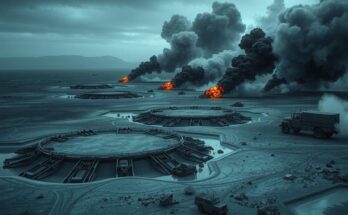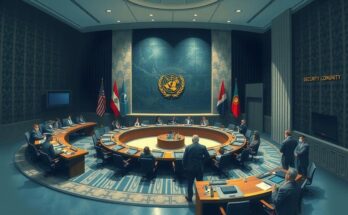The leaders of DR Congo and Rwanda are engaged in urgent talks as the M23 rebels, allegedly receiving Rwandan support, threaten to take Goma. The situation has resulted in over 100 deaths and a humanitarian crisis displacing hundreds of thousands. Protests have erupted in Kinshasa against foreign entities perceived as failing to act. The international community is calling for ceasefires and attention to the region’s stability.
Crisis talks have been initiated between Democratic Republic of Congo (DRC) President Felix Tshisekedi and Rwandan President Paul Kagame amid escalating violence in eastern Congo. The M23 rebel group, allegedly supported by Rwandan troops, appears poised to seize the strategic city of Goma. Following intense fighting, M23 captured Goma’s airport, leading to significant casualties, including over 100 fatalities and nearly 1,000 injuries, compounded by the humanitarian crisis affecting the region.
As the conflict evolved, it became evident that a substantial number of Congolese soldiers, reportedly more than 1,200, surrendered at the UN airport base. The nature of control over Goma remains ambiguous. While M23 claims it has taken the city, Congolese authorities continue to assert their presence, creating confusion following recent battlefield developments.
The escalated violence in Goma, linked to the legacy of the Rwandan genocide, has triggered severe humanitarian issues, compelling hundreds of thousands to flee their homes. The UN and NGOs are working to address critical medical needs with overwhelmed hospitals coping with a surge in casualties. Concerns have risen about potential public health crises due to looting and disruptions in aid supply chains.
Amid these developments, protests erupted in Kinshasa as citizens expressed anger toward foreign embassies for failing to intervene in the situation. Various embassies, including those of France and the United States, were targeted. The protests prompted the US Embassy to advise its citizens to depart Congo amid heightened tensions.
In response to the violence, the UN Security Council met to discuss the situation, warning of a resurgence of ethnic conflicts reminiscent of the genocide’s aftermath. The African Union called on the M23 group to disarm while international actors, including the US and China, urged for immediate ceasefires and respect for territorial integrity.
The DRC government has accused Rwanda of exploiting the region’s mineral wealth, while Rwanda contends its involvement targets the FDLR, a group associated with the genocide. The re-emergence of the M23, which had previously occupied Goma in 2012, has raised alarms regarding regional stability.
The Democratic Republic of Congo has long faced instability in its eastern provinces due to armed groups competing for control, often intertwined with the violent history dating back to the 1994 Rwandan genocide. The M23 group, primarily composed of Tutsi fighters, re-emerged in late 2021, leading to renewed military conflicts. Goma, as a strategic city, remains central to these disputes, impacting humanitarian conditions as well as regional politics, with international actors currently monitoring the situation closely.
The ongoing conflict in Goma highlights the complexities of regional tensions tied to historical grievances and economic motivations. Authorities grapple with a humanitarian crisis as hundreds of thousands face displacement and inadequate medical care. Diplomatic efforts are currently underway to manage the situation, with international calls for de-escalation and accountability directed toward both the M23 and external influences.
Original Source: www.france24.com




